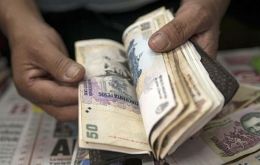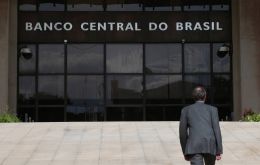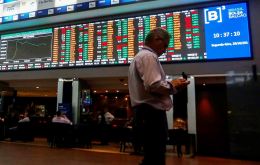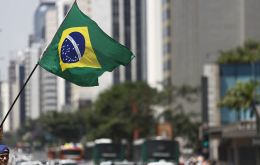MercoPress. South Atlantic News Agency
Tag: Central Bank
-
Tuesday, April 30th 2019 - 09:59 UTC
Argentine Peso gains strength as IMF agrees to more central bank flexibility

Argentina’s embattled peso gained strength on Monday after the central bank said it would ease limits on its foreign exchange market interventions, signaling its willingness to sell reserves in an effort to better control the volatility of the local currency. The peso began the session up 3.37% and closed 3.56% stronger at 44.37 per U.S. dollar.
-
Tuesday, April 23rd 2019 - 09:08 UTC
Brazilian central bank survey reveals growing expectation about pension reform

Economists continue to slash their forecasts for Brazilian economic growth this year, according to a closely watched survey published on Monday, intensifying the spotlight on a key Congressional vote on pension reform later in the week.
-
Wednesday, April 17th 2019 - 09:58 UTC
Argentina's inflation 54.7% in 12-months; more monetary “contraction measures” and support from IMF

Argentina's inflation rate accelerated for the third straight month in March, the government statistics agency said on Tuesday, prompting the central bank to unveil fresh measures to temper raging inflation and protect the embattled peso currency.
-
Friday, March 8th 2019 - 09:15 UTC
Euro zone interest rates frozen for twelve months given overall slowdown

Interest rates in the Euro zone will not rise until next year at the earliest, the European Central Bank has signaled amid evidence of a slowdown in the 19 countries using the single currency. The ECB also unveiled a round of fresh stimulus, offering banks cheap loans to try to help revive the economy.
-
Wednesday, March 6th 2019 - 08:26 UTC
Brazil posts a fiscal surplus in January, but public finances remain fragile

The Brazilian government posted a fiscal surplus of 46.9 billion reais (US$ 12.5 billion) in January, the central bank said, above forecasts but unchanged from a year earlier. In Brazil, January is traditionally marked by higher tax revenues and lighter spending, so these figures do not change the fragile outlook for public finances, analysts said.
-
Saturday, February 16th 2019 - 11:10 UTC
Brexit has cost UK economy some £80 billion since the 2016 vote, says BoE policymaker

Brexit has cost the British economy at least £80 billion since the referendum and the shock of a no-deal divorce could see interest rates slashed, according to a Bank of England policymaker. Gertjan Vlieghe, an external member of the central bank’s Monetary Policy Committee, said that, since the June 2016 vote, 2% has been shaved off GDP.
-
Wednesday, February 13th 2019 - 09:41 UTC
Stable low inflation and expansion forecasted by Brazilian financial market

Brazil's financial market has cut its forecast of the country's inflation rate from 3.94 to 3.87 percent for 2019 and kept the rate at 4% for 2020, the Central Bank of Brazil reported. According to the Focus survey conducted by the bank among Brazil's main financial institutions, the forecasts are within the official target of 4.25 percent, with a tolerance margin between 2.75 percent and 5.75 percent.
-
Friday, February 1st 2019 - 11:10 UTC
Brazil's fiscal deficit in December, a challenge for Bolsonaro and the new Congress

The Brazilian government posted a fiscal deficit of 41.13 billion reais (US$ 11.27 billion) in December, the third widest monthly deficit on record, the central bank said on Thursday. While it was in line with forecasts and amplified by seasonal factors, the shortfall highlights the challenge of exerting tighter control over the country's finances which new President Jair Bolsonaro has said is one of his top priorities.
-
Tuesday, January 29th 2019 - 08:30 UTC
Investors confident of Brazil: Net FDI flows equaled 4.7% of GDP in 2018

Brazil’s current account deficit doubled last year as economic growth fueled demand for foreign goods and services, while foreign investment reached its highest share of GDP since 2001, the central bank said on Monday.
-
Saturday, January 5th 2019 - 08:59 UTC
New Brazilian administration prepared to open concentrated banking to foreign competition

The fast pace of Brazilian president Jair Bolsonaro continued on Friday, with current central bank Governor Ilan Goldfajn telling newspaper Valor Economico that the new administration is likely to empower the central bank to approve the entrance of new foreign lenders into Brazil.
